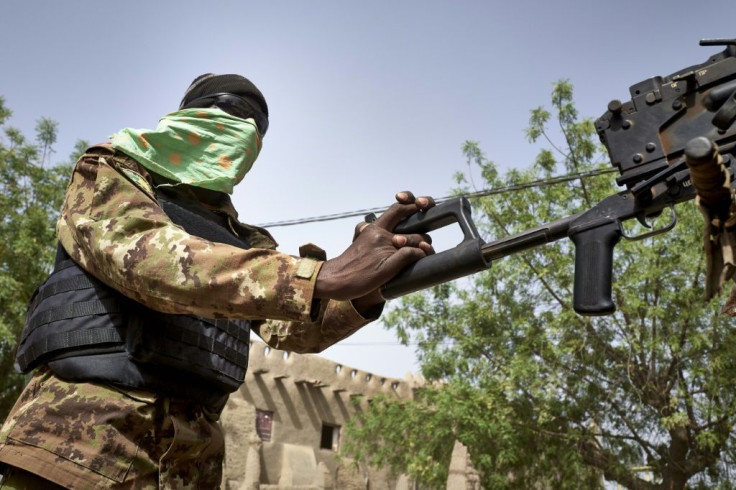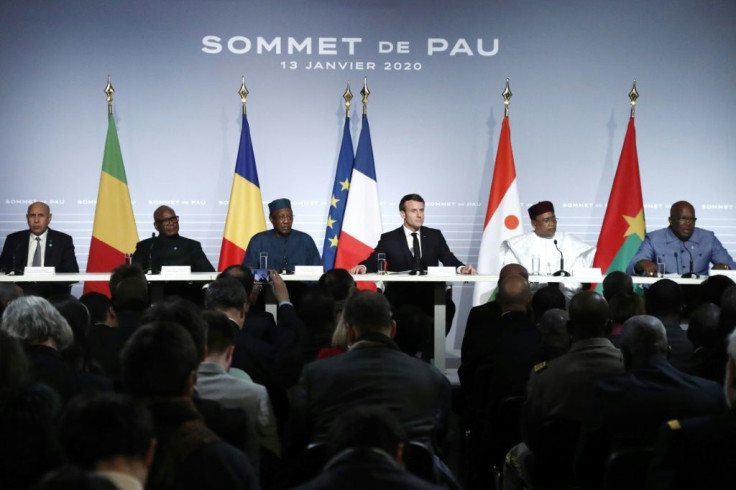Sahel Leaders And France's Macron To Talk As Violence Spirals
France and its allies in the Sahel next week will discuss the region's mounting struggles with a jihadist insurgency and ethnic bloodshed.
Militant attacks and ethnic massacres have become routine in parts of the vast semi-arid region, and state armies are increasingly accused of indiscriminately killing civilians.
Leaders of the so-called G5 Sahel military alliance -- comprising Burkina Faso, Chad, Mali, Mauritania and Niger -- plus President Francois Macron, are due to meet on Tuesday in the Mauritanian capital of Nouakchott.
The summit is a follow-up to talks in the French city of Pau in January that gave a political reboot to the flagging war against the jihadists.

Islamist insurgents in the Sahel first emerged in northern Mali in 2012, during a rebellion by Touareg separatists which was later overtaken by the jihadists.
Despite the presence of thousands of foreign troops, the conflict has since spread to the centre of the country, as well as to neighbouring Burkina Faso and Niger.
Thousands of soldiers and civilians have been killed in the conflict to date, while hundreds of thousands have had to flee their homes.
Following the Pau summit, France upped its military presence and has boasted of several recent successes -- its forces notably killed Abdelmalek Droukdel, the head of a notorious group called al-Qaeda in the Islamic Maghreb (AQIM), in northern Mali in June.

International opinion about the situation in the Sahel differs.
The United States, at a UN Security Council meeting in June, said security was deteriorating in the region and there had been no "significant progress." In contrast, UN Secretary-General Antonio Guterres has hailed "important" advances.
Tuesday's talks are taking place against a backdrop of entrenched problems, particularly in Mali, where the jihadist onslaught has pitched ethnic groups against each other.

Local infighting in Mali's volatile centre has gone "largely unnoticed," according to Ibrahim Maiga, a Bamako-based researcher for the Institute for Security Studies think tank.
And in a new development, jihadists respectively linked to al-Qaeda and the Islamic State group have begun to battle each other in central Mali, after long steering clear of one another.
Mali's peace process is also faltering, although few people are paying attention, said a European diplomat in Bamako, who declined to be named.
Mali's government signed a peace accord with some rebel groups in 2015, which is meant to lead to decentralisation in the vast country -- an option experts argue could defuse long-standing tensions.
On another front, President Ibrahim Boubacar Keita is facing protests over his perceived mismanagement of the country after years of bloodshed.
Mounting opposition to his leadership -- led by a newly resurgent opposition -- has Mali's international allies concerned about the stability of the war-torn country.
Other problems abound in the Sahel conflict.
A contingent of Chadian troops to the border region linking Mali, Burkina Faso and Niger, promised after the Pau summit, has yet to deploy.
But there are also increasing concerns about the conduct of local troops. Rights groups have accused Sahel armies of conducting indiscriminate killings of civilians this year, for example.
Mahamadou Savadogo, a Burkinabe researcher, said that these alleged killings show the "disarray of security forces" confronted with continued militant attacks.
A French government official, who requested anonymity, said that the danger is that the chaos in the Sahel will spread south, into West Africa's populous coastal states.
That fear already appears to be materialising.
In mid-June, Islamist militants killed 12 soldiers and a policeman in a border raid in Ivory Coast, the country's first jihadist attack since 2016.
© Copyright AFP 2024. All rights reserved.




















